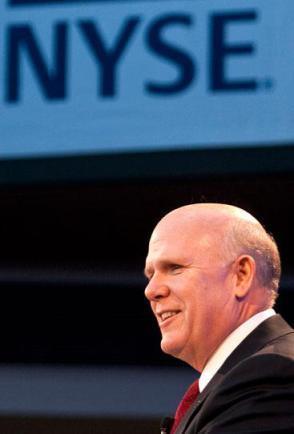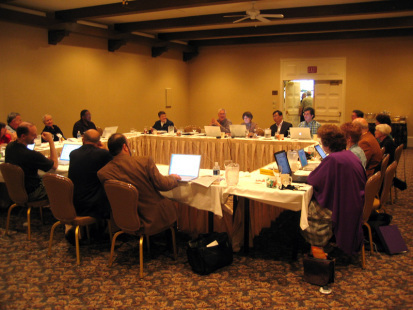Lee Ellis's Blog, page 342
December 10, 2013
FAQ – “What is the main similarity between the battlefield and the corporate world?
Here is a popular FAQ that Lee is asked – “What is the main similarity between the battlefield and the corporate world? What lessons of the battlefield can be transferred to the corporate world?”
Lee’s Answer: “In the battlefield and corporate world, you have to solve problems and overcome challenges. Likewise, both situations have competitors who are trying to beat them so both require information, strategies, plans, and good execution to win. The difference is the context and the fact that one is life and death of humans and the other is life and death of the company; but the idea of war is much more serious and so the two must never be confused. Of course these are significant differences, but there are certainly many correlations. Mainly, you have a mission and people and obstacles to overcome. Both situations require leaders to influence their people to achieve results and meet their goals. In the end, that’s what leadership has to do in civilian life or in the military.”
Do you agree with Lee’s answer? What are your comments on the topic? Thanks for sharing.
Related Articles:
Your Freedom in Leadership—Where Are You? New Checklist to Evaluate Personal Growth
Military Leadership and Corporate Business Leadership – Similarities and Differences


December 9, 2013
Article: “Better Corporate Boards Usually Lead to Higher Profits” – Read Why
In this recent report mentioned in Forbes Magazine, it concludes that “An ideal board weight does not exist in an absolute sense. What is appropriate for one company may not be appropriate for another. However, a company’s board weight ranking should not be significantly out of sync with its revenue ranking or scale.”
The report also mentions that success is largely determined on the board’s willingness and expertise in working with all levels of the organization to affect corporate guidance and improvement.
Click here to read the article.
What are your thoughts on this report? Regardless of the size of your organization, what has been your success in working with your board of directors? Please share your comments and insight.


December 3, 2013
Leadership Snapshot – Vietnam POW 40th Reunion News Coverage – Watch Here
Step back in time for a few minutes and join us in reviewing this fantastic video from The Nixon Foundation chronicling this year’s 40th Anniversary of the Vietnam POWs return home. You’ll love some of the archive footage that they’ve compiled, and you’ll likely learn something new about life and leadership, too. Please watch and share!
Related Articles:
Leadership and Overcoming Bitterness – Listen to This Conversation
In Memory – Brig. Gen. Robbie Risner – A True Hero, Leader, and Great American


Two Proven Themes for Positive Accountability in 2014
By Lee Ellis
Take a moment to reflect back on 2013 and recall the parade of high profile leaders who have not taken responsibility for broken pledges (simply scan “leadership broken promises” in a web search). Can you see how natural and frequent it is to justify, redefine, or shift blame to others rather than take responsibility when promises are broken? Regardless of how much this violation of trust is played down, it’s a serious matter when leaders put their own needs above their commitments.
Looking Back on 2013
As we began the new year, I challenged all of us to focus on accountability beginning with ourselves as individuals. My main point was holding ourselves personally accountable for keeping our promises and commitments.
Two questions for you –
- How did it go this year? Have you raised yourself to a consistently higher standard in owning your responsibilities, keeping your word, and meeting your commitments?
- If you think you are above any problems in this area, are you willing to ask others for their direct and honest feedback about you?
Keeping our personal and professional commitments is crucial. If we don’t –
- it diminishes our influence as a leader.
- it also undermines our credibility to confront others who need to be held accountable.
These are all good reasons to continue growing in personal accountability and focus on holding others accountable.
Changing the Negative Image of Accountability
I know some people don’t like the word accountability because it seems hard and difficult to do for the leader.
“Accountability is not about using fear or threat of punishment as a motivator; it’s about proactively helping people and teams get better results and achieve success.”
But it’s not about using fear or threat of punishment as a motivator; it’s about proactively helping people and teams get better results and achieve success. Reframing the positive image of accountability is so needed in today’s culture that I’m writing a concise “how to” book to help you deal with the subject.
The book will cover several major themes (the working title is Courageous Accountability and Leading with Honor), but here’s an overview of two of those themes with insights that can guide you in 2014.
1. Courage
Let’s be honest—confronting people about their behaviors or performance can feel uncomfortable because we fear it will bring conflict. That’s normal for most all of us, but underneath that fear is a lie that it’s going to turn out bad. The truth is that when confrontation is done appropriately, it’s the most caring thing to do. In his latest book, The Advantage, Pat Lencioni addresses this, saying “…failing to hold someone accountable is ultimately an act of selfishness.”
How can a person improve if you don’t tell them? Actually, in not confronting, you’re mainly protecting yourself at the other person’s expense and your relationship with them. My definition of courage is doing the right thing even when it doesn’t feel natural or safe, and leaders who display accountability in a strong, positive way have to be courageous!
“My definition of courage is doing the right thing even when it doesn’t feel natural or safe, and leaders who display accountability in a strong, positive way have to be courageous!”
2. Clarity
You must get clarity before you can give clarity. At the 100,000 foot level, this means you and your people must have a clear understanding of mission, vision, values and the culture of the organization. Then, at lower levels, clarity includes an understanding of professional standards, your personal style and operational guidelines, and clarity about expected outcomes. There also needs to be an ongoing dialogue to maintain alignment by clarifying how things are going and whether or not any coaching or help from you is needed. Clarity on the rewards and consequences for performance and behaviors is also critical.
Think about your stance on accountability for yourself and for others. What have been your accountability failures? What did you learn from them? What have been your accountability successes? Our followers would love to hear your thoughts, and your input would be helpful to me as I’m working on my new book*.
Best wishes for a Merry Christmas, Happy Hanukkah, and a Happy New Year from all of us at FreedomStar Media.
LE
*Lee welcomes your questions and comments in this blog forum, or you may email him at Contact@FreedomStarMedia.com.
Previous Articles in This Series:
Part 1 – What is Accountability and Notes from the Cliff
Part 2 – Why Accountability is Crucial to Life and the Superbowl
Part 3 – Shocking Cheating Scandal at Harvard and Clarifying Expectations
Part 4 – How Mentoring and Coaching Builds Trust
Part 5 – Seven Tips to Celebrating the Big Payoff
Part 6 – How to Take Actions When Expectations Aren’t Met
~~~
Lee Ellis is founder and president of Leadership Freedom® LLC, a leadership and team development consulting company. He consults with Fortune 500 senior executives in the areas of hiring, teambuilding, leadership and human performance development, and succession planning. He is also a speaker and the author of the award-winning book, Leading With Honor: Leadership Lessons from the Hanoi Hilton, in which he shares his experiences as a Vietnam POW and highlights leadership lessons learned in the camps. For more information, please visit www.leadingwithhonor.com.


December 2, 2013
3 Characteristics of Great Leaders from GM CEO, Dan Akerson
 This interview article from Washington Business Journal blogger, Ingar Grev, confirms yet again that great leadership attributes are simple but not always easy.
This interview article from Washington Business Journal blogger, Ingar Grev, confirms yet again that great leadership attributes are simple but not always easy.
One of his quotes in the article below says, “The overwhelming majority of leaders I’ve seen [early in my career] were mediocre at best. There are a number of reasons…but primarily it’s due to leaders thinking too highly of themselves, poor promotion and hiring criteria, and poor preparation.”
Please read this article, and let us know if you agree –
LE


November 26, 2013
“Checking Your Organizational Pulse: Four Healthy Ways to Improve Business Reputation and Results” – The Latest Article from Lee Ellis
Does anyone not want a great reputation in their respective marketplace? What may be a secret for some leaders is that building reputation and results is directly tied to great leadership; and great leadership comes from men and women who are willing to be authentic, wise, courageous, character-focused, and humble.
This is one of the latest articles from author and human performance consultant, Lee Ellis, published in Smart Business Magazine. Click to read on their website.
Do you agree with his recommendations? Please share your comments –


November 21, 2013
Why Should a Leader Be Generous? What’s the Benefit? Read More…
 True Leaders are called to do many things–including sacrificially giving time, talent, and money to others. You can’t do it all, and you can’t give to every person or cause.
True Leaders are called to do many things–including sacrificially giving time, talent, and money to others. You can’t do it all, and you can’t give to every person or cause.
But you can strategically choose to be generous to the people and organizations that have personal significance in your life. Giving keeps the focus off yourself, and it helps limit personal greediness and self-preservation.
During this season, Lee Ellis and FreedomStar Media are especially grateful for several organizations and their work, and he enthusiastically supports them by donating a portion of his time and sales proceeds. Click here to learn more about them.
What do you support, and why do you choose to be a generous leader? Thanks for sharing!


November 14, 2013
How to Spot Authenticity in Other Leaders – 90-Second Video Clip from Bill George
How do spot authenticity in other people? This 90-second interview with author Bill George shares his thoughts on the attributes that he seeks when evaluating authenticity in others.
Do you agree with his comments? Please share your perspective.
Related Posts:
How to Train Yourself to Make Character-Based Decisions
How Do You Clearly Understand Your Personal Leadership Strengths and Struggles?


November 12, 2013
Leadership and Overcoming Bitterness – Listen to This Conversation
On Veteran’s Day, Lee had a great conversation with Chris Fabry on “Chris Fabry Live” Talk Radio.
All leaders are faced with the opportunity to embrace of free yourself from bitterness. Hear his intimate thoughts on this topic as well as the top lessons learned that has helped guide his life and work.
Are you facing an opportunity to live with long-term bitterness? And if you’re overcome offenses and bitterness, how did you do it? Please share your wisdom –


November 8, 2013
Why Veterans Day is Important for All Leaders and Citizens – Please Read
Editor’s Note: As we celebrate Veterans Day 2013, we asked Lee Ellis to share his thoughts on the importance of this observance and why its critical to keep them in our thoughts and prayers on a regular basis –
“Often when I speak to large groups, I’ll ask for a show of hands of those who have a veteran in their immediate family—as parent, spouse, sibling, or child. I’m amazed to see the hands of 60-80 % of the audience go up.
The truth is that most of us are closely connected to a veteran, and we appreciate what they have done and are doing. This week, I stopped to reflect on the rigorous training, the deployments, and the service that our veterans have endured to protect our freedoms. I’m so grateful and in awe of their sacrifices and just as much for their families who have also sacrificed so much along the way.
I still cannot fully comprehend the pain and suffering my family went through when my aircraft went down and pain of not knowing for sure if I was dead or alive. Then when they found out I was a POW, they endured more than five the years of knowing I was in a far-away communist prison camp but not knowing what torture and deprivation I might be suffering.
Many of our veterans are still carrying a heavy load of pain and suffering, and we need to honor them and all who have served. Please take time out this weekend to reflect on their sacrifices, and where possible let them know of your gratitude.
This short commercial below has no words, but you will get the message; we love and honor our vets—young and old.” LE










